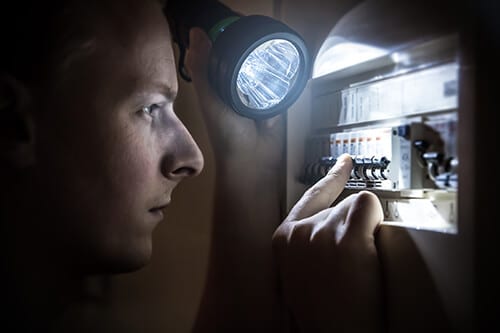11 Things to Do During a Summer Power Outage

Here in the Pacific Northwest, it’s common for wild and unpredictable storms to knock out power for days or weeks at a time. Not only is this a major inconvenience, but it can also cause serious health and safety issues. The intense heat of summer can lead to dehydration, heat stroke, and even death. Navigating your home in pitch black can also lead to its own set of hazards and injuries. Fortunately, there are some steps you can take to stay safe, healthy, and relatively comfortable during a power outage. Here at Brennan Electric of Seattle, we’ve been through plenty of outages since going into business in 1987, and we’re ready to share some of our top tips for what to do during a summer power outage with you.
1. Stock Up on Clean Water
Depending on your home’s water access, you may or may not have running water during a power outage. For example, homes that rely on pumps to draw up well water won’t have access to fresh running water. However, even homes connected to city water can benefit from storing water – even if it’s just for your peace of mind. The rule of thumb is to have two gallons of water per person for each day of the blackout. Since it’s impossible to know how long a power outage will last, it’s recommended to have a two-week water supply. While it’s best to have plastic water containers for your water, you can fill up a clean bathtub as an alternative.
2. Stay Hydrated
The longer your central air conditioner is down, the hotter and stuffier your house will get. Staying hydrated during a summer power outage will help you regain water lost via sweat. In addition to plain water, juice and sports drinks are excellent options because they will help keep your electrolytes balanced. It’s best to avoid caffeinated beverages like coffee and soda during the power outage. As a mild diuretic, caffeine will cause you to lose water and dehydrate more quickly. You should also avoid drinking alcohol. Alcohol prevents your body from releasing an important antidiuretic hormone which will cause you to urinate more frequently.
3. Keep Air Circulating
Circulating air will help you feel cooler and more comfortable as you wait for the power to come back. You can facilitate natural ventilation by opening two windows on opposite sides of a room. This will create a comfortable cross breeze and help draw warm, stagnant air out of the space. This method is most effective in the early morning and evening since those are typically the coolest times of the day. This means you may need to shut your windows around lunchtime to avoid the midday heat.
4. Invest in a Battery or Solar Fan
Even a small fan can bring you some much-needed reprieve from the heat. Many home goods and camping stores sell fans powered by batteries or solar energy. You can get the most mileage out of your fan by placing it near a window to draw cooler air into your home.
5. Change into Lightweight Clothing
Lightweight clothing will help your body release heat instead of retaining it, allowing you to feel cooler and more comfortable. Cotton and linen are ideal because they’re breathable fabrics. Avoid wearing clothes made of wool, fleece, flannel, and nylon because they have insulating properties. Any clothes you wear should be loose and lightweight to facilitate good air circulation. If you choose to go outside, clothes that fully cover your arms and legs will protect your skin from the sun and help wick sweat from your body.
6. Avoid Direct Sunlight
Try to avoid direct sunlight since it will raise your body temperature and cause you to lose valuable water from sweat. Closing curtains in rooms that receive direct sunlight can help cool down that room. Keep in mind that since the sun rotates throughout the day, you may have to open and close your curtains periodically.
7. Each Potassium Rich Foods
Although it’s not as obvious as cool air and water, the food you eat can also play a role in how cool you feel. Certain foods have a cooling effect on your body, especially those rich in the mineral potassium. Potassium helps regulate the balance of water and minerals in your body, creating a natural cool-down for your overheated core. Some of the best potassium-rich foods are bananas, avocado, oranges, and leafy greens. Food that generally has high water content, like fresh fruit and vegetables, are also great additions to your diet because they will help you stay hydrated.
8. Seal Up Air Leaks
Air leaks can allow heat from the outdoors to seep into your home, raising the overall temperature despite any measures you take to cool down or ventilate the space. Sealing up any leaks will lead to a more consistent, comfortable temperature indoors. Air leaks are most commonly found around windows and doors; depending on the severity of the leak, you may be able to feel it with your hand or detect it with a lit candle. When you find a leak, simply cover it with weather stripping or foam insulation tape. Although these are not permanent solutions, they will help reduce the amount of heat your home absorbs during the power outage.
9. Avoid Strenuous Physical Activity
Physical activity will raise your body’s core temperature and become uncomfortable if there’s no good way to cool down. Try to avoid exercise and strenuous activity during the hottest times of day. Instead, plan your activities for the cool early morning hours and late evenings. If you have to work outside, do your best to avoid working in direct sunlight and make sure you’re wearing light, breathable fabrics.
10. Use Battery-Powered Lighting
Battery-powered lights will provide you with valuable illumination after the sun sets. Not only will lights help you accomplish your daily activities like cooking, cleaning, and entertainment, but they will also help you safely navigate your home without tripping or falling. When it comes to choosing the right battery-powered lights, you have a range of options to select from at different price points. Flashlights are a classic staple of emergency preparation kits because they’re small, portable, and convenient. However, larger devices like lanterns provide a greater amount of illumination and are better for ambient lighting. Some camping lanterns are solar-powered, so you can charge them during the day and not have to worry about the batteries dying at an inopportune time.
11. Install a Backup Generator
A backup generator can make a huge difference during a power outage. Instead of suffering through the heat and darkness of having no power, a generator will allow you to maintain your fans, lights, and appliances. Generators come in a range of sizes and fuel types, including fuel-based and solar, so you can be sure to find one that meets your needs. Brennan Electric installs and services standby generators to help you get through the worst of a power outage with minimal discomfort.
Your Electrical Service Partner in Seattle
If you’d like help preparing your home for the next summer outage, Brennan Electric can help. Our licensed electricians will help you choose the right solutions for maintaining a safe and comfortable home if a storm knocks out your power. We provide a wide range of electrical services, from generator installation to surge protection and electrical repairs. Just give us a call to speak with one of our knowledgeable staff members!

